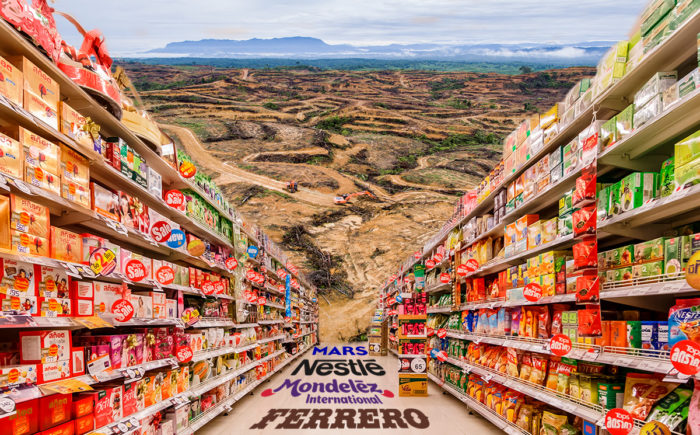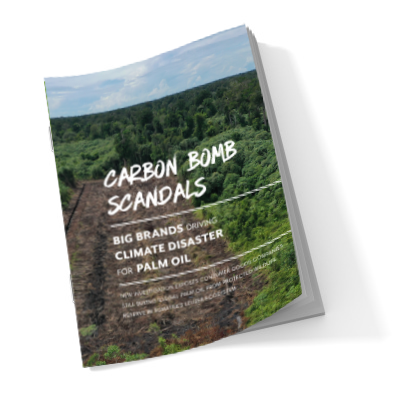Indonesia’s Leuser Ecosystem is a world-class hotspot of biodiversity and is among the most ancient and life-rich ecosystems ever documented by science.
At six-and-a-half-million acres, the Leuser Ecosystem (pronounced “low sir”) is like no place on Earth — it’s the last place where Sumatran orangutans, elephants, tigers, rhinos and sun bears all roam the same habitat.
But the survival of the Leuser Ecosystem is at a crossroads: while it’s technically protected under Indonesian national law, in reality deforestation for palm oil, pulp and paper plantations, new roads, energy projects, illegal logging and poaching, and mining threaten the entire ecosystem and the well-being of millions of people who depend on it for their food, water, and livelihoods.
What is the Leuser Ecosystem?
Home to over 105 mammal species, 382 bird species, and 95 reptile and amphibian species, the Leuser Ecosystem is one of the last remaining habitats where so much wildlife can still thrive. But now deforestation is bringing the Leuser Ecosystem’s wildlife to the very brink of extinction. This ecosystem is truly the last stand for survival for many iconic wildlife species and a critical reason why we must work so hard to keep its forests standing.The Leuser Ecosystem provides food and water for millions of people. Generations depend on this uniquely biodiverse forest ecosystem for their livelihoods and have done so for millennia as it is the customary lands for the Gayo, Alas, Kluet, Aneuk Jamee, and Karo peoples. These communities, and many others in Aceh and North Sumatra, have fought for over a century to protect the integrity of the Leuser Ecosystem’s extraordinary forests, peatlands, wild rivers, and montane environment.
Deforestation threatens nearby communities with catastrophic flash flooding, a human-made disaster that’s become too common in regions of Indonesia that have been developed for Conflict Palm Oil.
And the Leuser Ecosystem plays a substantial role regulating the global climate by storing massive amounts of carbon in its forests and peatlands. When these areas are drained or set on fire, thousands of years of stored carbon are released into the atmosphere. In bad fire years, this has been estimated as comparable to the fossil fuel emissions of all of Western Europe!
Who’s destroying the Leuser Ecosystem and why?

Massive corporations — well-known global brands and banks — are driving the destruction of the Leuser Ecosystem for commodities like Conflict Palm Oil, an ingredient used in everything from shampoo and lotions to cereal, noodles, crackers, candy, and cookies. This cheap oil, also used in fast foods, is causing massive long-term damage to the Leuser Ecosystem, and to the wildlife and people who depend on it to survive. Corporate profits are directly tied to the bulldozing, burning, and destruction of the last intact forests and peatlands of Indonesia’s rainforests.
The brands and banks responsible for fueling this destruction are global corporations with global customers, which is why they need to hear from you today.
With your help, we’ve pressured major corporate players — and, in turn, their palm oil suppliers or financial clients — to accept responsibility and start taking action. But in order to fully stop the chainsaws and bulldozers pushing into the last remaining rainforests, and the violation of the rights of local communities, public outcry and exposure are critically needed.
We need the corporations driving the Leuser Ecosystem’s destruction to take urgent action to protect this priceless ecosystem.
How we win.
RAN works closely with local partners in Indonesia to keep the Leuser Ecosystem intact and to elevate the voices of communities whose rights and livelihoods are impacted by palm oil development — including the people of Bunin Village in the Leuser Ecosystem foothills.
We deploy our team of field investigators to the rainforest frontlines to document the deforestation and destruction and we track the palm oil to brands and banks buying and financing it and publicly expose them.
With your help, we make sure companies know how their customers feel about their role in fueling rainforest destruction and the climate crisis.
Our successes in the Leuser Ecosystem show that by following the money trail, tracking and transforming forest-risk commodity supply chains, and holding some of the world’s largest brands and banks accountable, we can ensure long-term protection of forests, uphold rights for communities, safeguard critical habitat for endangered species, and help secure the livelihoods for the millions of people who directly depend on this incredible ecosystem.













